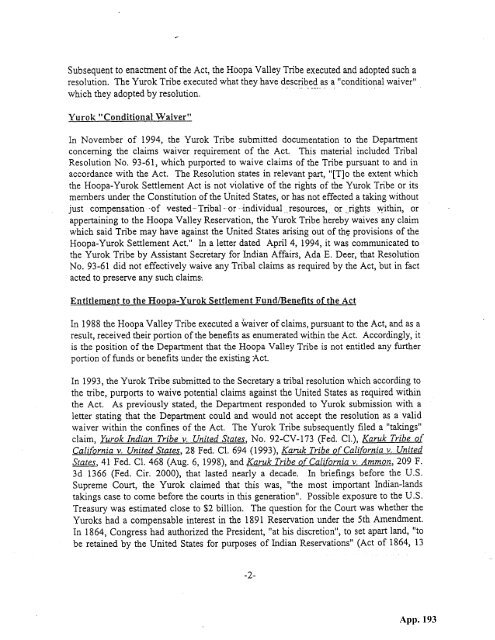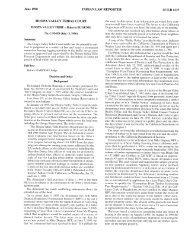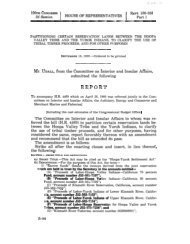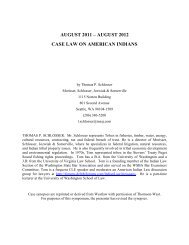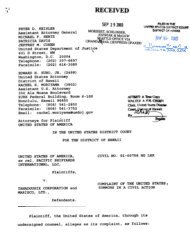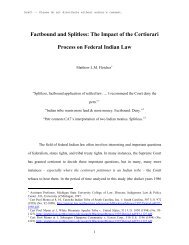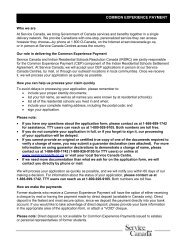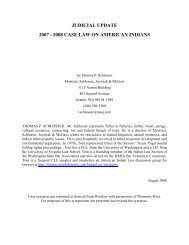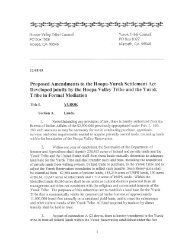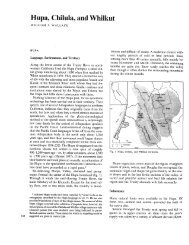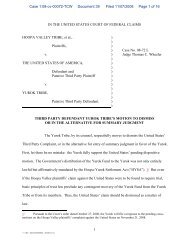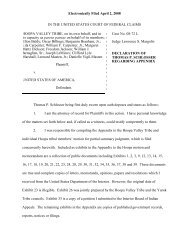Hoopa appendix supporting summary judgment - Schlosser Law Files
Hoopa appendix supporting summary judgment - Schlosser Law Files
Hoopa appendix supporting summary judgment - Schlosser Law Files
Create successful ePaper yourself
Turn your PDF publications into a flip-book with our unique Google optimized e-Paper software.
Subsequent to enactment of the Act, the <strong>Hoopa</strong> Valley Tribe executed and adopted such a<br />
resolution. The Yurok Tribe executed what they have described as a “conditional waiver”<br />
which they adopted by resolution. -<br />
Yurok “Conditional Waiver”<br />
In November of 1994, the Yurok Tribe submitted documentation to the Department<br />
concerning the claims waiver requirement of the Act. This material included Tribal<br />
Resolution No. 93-61, which purported to waive claims of the Tribe pursuant to and in<br />
accordance with the Act. The Resolution states in relevant part, “ETJo the extent which<br />
the <strong>Hoopa</strong>-Yurok Settlement Act is not violative of the rights of the Yurok Tribe or its<br />
members under the Constitution of the United States, or has not effected a taking without<br />
just compensation -of vested- Tribal -or individual, resources, . or .rights within, or<br />
appertaining to the <strong>Hoopa</strong> Valley Reservation, the Yurok Tribe hereby waives any claim<br />
which said Tribe may have against the United States arising out ofth~provisions of the<br />
<strong>Hoopa</strong>-Yurok Settlement Act.” In a letter dated April 4, 1994, it was communicated to<br />
the Yurok Tribe by Assistant Secretary for Indian Affairs, Ada E. Deer, that Resolution<br />
No. 93-61 did not effectively waive any Tribal claims as required by the Act, but in fact<br />
acted to preserve any such claims:<br />
Entitlement to the <strong>Hoopa</strong>-Yurok Settlement Fund/Benefits of the Act<br />
In 1988 the <strong>Hoopa</strong> Valley Tribe executed a ‘.vaiver ofclaims, pursuant to the Act, and as a<br />
result, received their portion of the benefits as enumerated within the Act. Accordingly, it<br />
is the position of the Department that the <strong>Hoopa</strong> Valley Tribe is not entitled any further<br />
portion of funds or benefits under the existing Act.<br />
In 1993, the Yurok Tribe submitted to the Secretary a tribal resolution which according to<br />
the tribe, purports to waive potential claims against the United States as required within<br />
the Act. As previously stated, the Department responded to Yurok submission with a<br />
letter stating that the Department could and would not accept the resolution as a valid<br />
waiver within the confines of the Act. The Yurok Tribe subsequently filed a “takings”<br />
claim, Yurok Indian Tribe v. United States, No. 92-CV-l73 (Fed. Cl.), Karuk Tribe of<br />
California v. United States, 28 Fed. Cl. 694 (1993), Karuk Tribe of California v. United<br />
States, 41 Fed. Cl. 468 (Aug. 6, 1998), and Karuk Tribe of California v. Ammon, 209 F.<br />
3d 1366 (Fed. Cir. 2000), that lasted nearly a decade. In briefings before the U.S.<br />
Supreme Court, the Yurok claimed that this was, “the most important Indian-lands<br />
takings case to come before the courts in this generation”. Possible exposure to the U.S.<br />
Treasury was estimated close to $2 billion. The question for the Court was whether the<br />
Yuroks had a compensable interest in the 1891 Reservation under the 5th Amendment.<br />
In 1864, Congress had authorized the President, “at his discretion”, to set apart land, “to<br />
be retained by the United States for purposes of Indian Reservations” (Act of 1864, 13<br />
-2-


